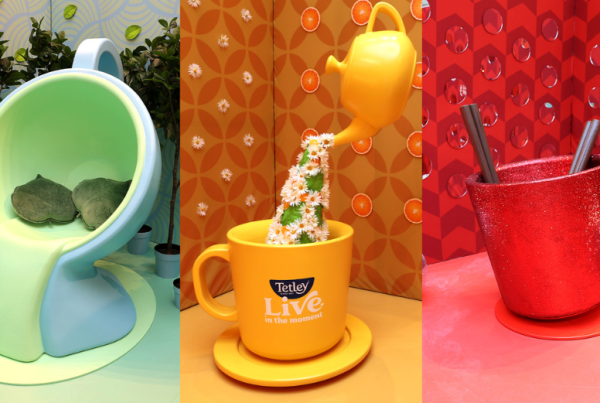Research shows that can help you build lasting bonds with your customers. According to the Tempkin Group, people who have a positive emotional association with a brand are more than eight times more likely to trust the company and more than seven times more likely to buy from them.
Here are a few tips to ensure your experiential marketing initiatives make an impact:
Go for the unexpected – and the Instagrammable
A truly successful experiential marketing initiative is surprising enough for people to tell their friends about it, and visually impactful enough for them to snap photos and share them online. That’s not just a good litmus test for the success of your project – it’s an opportunity for high-impact, free marketing.
A great example of a surprising and Instagrammable initiative was an installation at London’s Waterloo tube station for the all-female Ghostbusters movie remake in 2016. Commuters going through the station were met with a gigantic, angry-looking Stay Puft Marshmallow man’s head appearing to burst through the tiles of the station floor. It’s startling, it’s fun, it’s nostalgic, and it helps people get caught up in the excitement of a beloved movie franchise.
Not only that, it makes for amazing selfies. The visual element is key here because while on the one hand this offers a great experience for the commuter who walks by and engages with it in person, it also offers ample opportunity for sharing incredible photos on Instagram, Twitter and Facebook. That’s what will really make your initiative catch fire.
One of the greatest advantages to an experiential marketing campaign as compared to traditional marketing initiatives is that they’re an opportunity to engage all of your customers’ five senses with your product.
An example I always come back to is Pantone’s pop-up cafes. Pantone has run temporary cafes in Monaco and New York, and while the colour brand may not have much to do with lattes, they found a surprising way to make the link: each drink or food item is branded with its corresponding Pantone colour, like the 16-1731 strawberry pink eclair. The unexpectedness gets people talking, the food and drinks they’re selling are Instagram-worthy, and it allows Pantone to engage customers’s senses of taste, smell, sound and touch in a way that colour chips on their own simply can’t. That sensory experience creates a positive connection with the brand that will leave a lasting impression on your audience.
Showcase your brand’s values
Your experiential marketing initiative doesn’t always have to directly connect to your product’s content, as long as it clearly reflects your product’s values. Lean Cuisine,the frozen meals company, has done a great job of this. They wanted to move their brand away from its traditional image as a diet food line with a focus on weight loss, and towards one that focuses on helping customers be healthy and feel happy.
Part of that revamp was a highly impactful initiative at New York’s Grand Central station. An artist made chalk boards that looked like weigh scales, and asked women to write on them how they wanted to be weighed. Most chose to interpret that not as a number on a scale, but in terms of the personal accomplishments they were most proud of — finishing degrees late in life, caring for those in their community, raising successful kids as a single parent. Lean Cuisine filmed the experience, including emotional interviews with the women who participated, and turned it into a highly impactful commercial. It spreads a positive, meaningful message, and it also reflects the new values that Lean Cuisine wants to represent.
Play around
Few things leave a longer-lasting impression on your potential customers than a truly fun experience, and this kind of emotional connection is key to converting. So make your initiative into an opportunity for them to release their inner child and play around. When we opened StickerYou: The Store, our retail space, it was more than just a place to sell custom stickers. We designed it as an immersion in the creativity and subsequent inspiration of stickers, custom labels and temporary tattoos. We created stickerbombed walls, kiosks where customers could make their own stickers on the spot, installed a sticker museum and gave customers the chance to feel the quality of our products and the potential they hold for business or personal expression in a fun, relaxed environment that invites
Another example of making an experience fun and encouraging customers to play around is JetBlue’s “Icebreaker” challenge, after the airline had just started offering direct flights from New York to Palm Spring. To celebrate the idea of going from a chilly climate to a balmy one, they set up a gigantic block of ice on the streets of New York with fun vacation-themed prizes inside: flip flops, snorkel gear, even free plane tickets. If you could break the items out of the ice, you could keep them. It’s in line with the idea of their new winter getaway flights, and it also offers a fun challenge to passersby. Beyond creating an opportunity to engage with your brand, a fun experiential marketing initiative can be a great way to brighten someone’s day.
Source: How to Maximize Experiential Marketing Initiatives | CEOWORLD magazine













